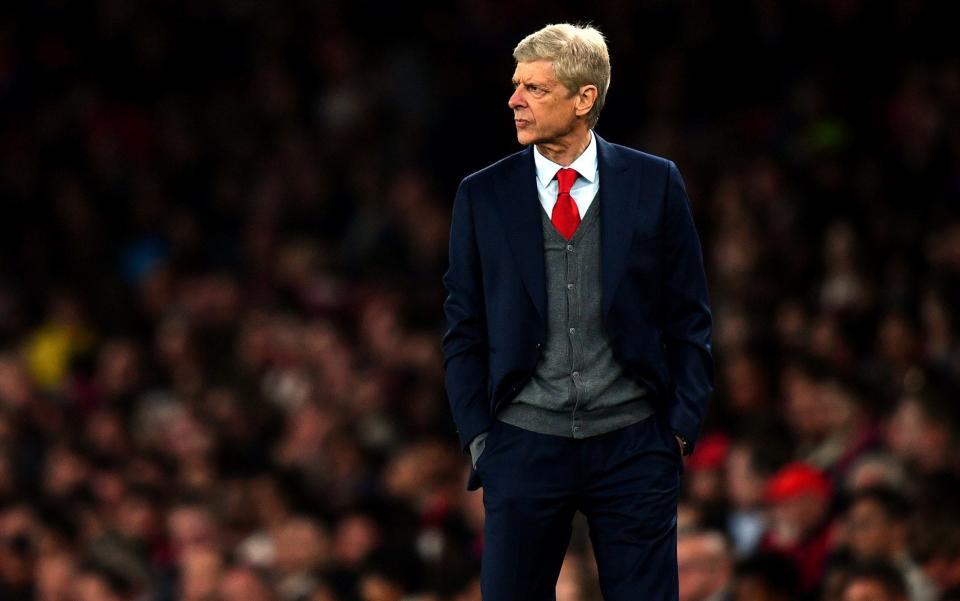Is Arsene Wenger the greatest manager never to win in Europe after failing on all three fronts?

The chances are that Jose Mourinho would have a phrase for it. The Manchester United manager stands alone in winning both the Champions League and the Europa League twice. Arsene Wenger, in contrast, has never won a European trophy. And the Portuguese is the man who once branded an old enemy a “specialist in failure”.
Another argument is that Wenger may be the greatest manager never to win a European trophy; certainly the greatest club manager of the last six decades who has worked at major European clubs. That could all change: sandwiching perhaps his final clash with Mourinho on Sunday is the Europa League semi-final against Atletico Madrid. He could exit Arsenal in both fitting and uncharacteristic fashion, securing silverware on the continent at the last and finding a way of qualifying for the Champions League that, unlike fourth place, actually is a trophy.
READ MORE: Where next for departing Wenger?
READ MORE: Exclusive – Pochettino considers future as Real circle
Or maybe the Frenchman will finish will an exercise in bittersweet Wenger-esque consistency: a 19th consecutive season of playing European football after Christmas without actually claiming the eventual prize. Wenger has been the unrewarded constant, the byword for last-16 departures from the Champions League.
All of which feels a little cruel. Wenger has a unique and unwanted distinction, one which, as the Cup Winners’ Cup no longer exists, he will retain. He is the only manager to lose in the finals of all three European competitions.
His Monaco were beaten by an arguably less gifted Werder Bremen side in the 1992 Cup Winners’ Cup final. His Arsenal were defeated on penalties by 10-man Galatasaray in the 2000 Uefa Cup final. His 10-man Gunners took the lead against Barcelona in the 2006 Champions League final and were 15 minutes from glory. Samuel Eto’o and Juliano Belletti had other ideas.
All of which means Wenger has conquered Europe fewer times than Tony Barton or Roberto Di Matteo. They had one-off triumphs, he a career of seismic significance, but lacking that crowning glory on the continental stage. There are managers who have disappeared into the mists of history who have won European trophies: not Wenger, though, the man with the historic achievement of producing England’s only unbeaten champions since 1889. He has managed 248 games in European competitions, 201 of them in the Champions League, a huge body of work that has produced some memorable victories and generated vast revenues, but not delivered the game’s essential purpose of glory.

And it does matter. There is a case for calling Arsenal the biggest club, or the most prominent, or the wealthiest, or the most constant presence among the elite, never to win the Champions League. Wenger has been one of the finest and most influential managers of the last 30 years. He has built some of the most watchable, most accomplished sides. His peers include men such as Mourinho, Sir Alex Ferguson, Pep Guardiola, Marcello Lippi, Louis van Gaal, Ottmar Hitzfeld, Vicente del Bosque, Carlo Ancelotti, Jupp Heynckes and Rafa Benitez. They are all Champions League-winning managers. He is not.
And if it is both simplistic and wrong to define greatness simply because of Champions League wins, it is nonetheless a measure. By many criteria, Wenger is France’s greatest managerial export. Yet the rookie Zinedine Zidane could win his third Champions League in as many seasons in May. Wenger’s achievements lie in other fields.
His place in posterity is likeliest to be preserved in France and England. It should be indisputable in his native country and adopted homeland that he is a great; those elsewhere whose are fixated on the Champions League may need more persuasion. But once the animosity of recent years has died down, memories of his 1998, 2002 and 2004 title winners, teams who combined solidity with modernity, pace with power, the physical with the technical, should remain. And yet they may not get sufficient recognition elsewhere, for one fundamental reason: they were not Champions League winners in an era when that became the measure of greatness.
Wenger’s first champions were slow to adapt to Europe. In 2003-04, however, they were arguably the continent’s finest side. They were knocked out by Claudio Ranieri’s Chelsea. A brash newcomer called Mourinho instead became the Champions League winner that year.
Wenger reinvented Arsenal, but was defined by his era, when the elite managers were in the Champions League every year, where one outstanding team – and he kept facing Barcelona or Bayern Munich – could end his chances on annual basis. In that respect, he could be a trailblazer. Some of the finest managers of the younger generation – Jurgen Klopp, Massimiliano Allegri, Antonio Conte – have domestic titles but, like Wenger, no European crown. He had a team that, for over a decade, was one of the 10 best in Europe but, if the law of averages suggested he should have been rewarded with a Champions League win, the laws of knockout football dictated otherwise.
Now Wenger may be one aggregate defeat from the end of another European adventure, a three-decade odyssey that has deprived him of silverware. And, perhaps, the status he deserves.

 Yahoo Sport
Yahoo Sport 






































